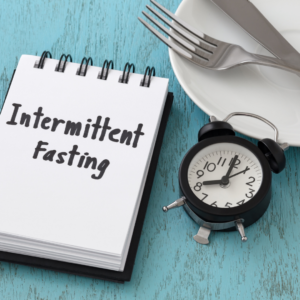Intermittent fasting (also known as IF) has become popular in recent years, primarily as a weight loss tool, but also to help control things like diabetes.
The premise of intermittent fasting is that you have an extended period of time each day where you don’t eat. A more accurate term is actually ‘time restricted eating’ because we tend to focus on the window in which we’re actually eating.
The definition of intermittent fasting is not clear, and this is one of the challenges I’ve seen with it. Are you doing IF if you’re fasting for 12 hours each day? Or does it need to be 18? Or 20? There is no clear answer. But a typical pattern to follow is eating for 8 or 10 hours and fasting for 14 or 16 hours.
Another somewhat common pattern of IF is eating normally for 5 days each week, and for the other 2 days each week eating only 500-600 calories each day.
The premise of intermittent fasting is that when you don’t have constant access to glucose as a fuel (through carb consumption), you’ll burn your fat stores for energy.
Limiting the amount of time each day that you use glucose as a fuel can absolutely be helpful for blood sugar regulation. Supporting our body’s ability to move between using sugar and fat as a fuel is a really important thing that we need to be able to do. With this improved blood sugar regulation, intermittent fasting can be very helpful in improving prediabetes or type 2 diabetes.
Another benefit to IF is not eating at night. Our body is not meant to eat late in the day, even though late night snacks have become the norm in our North American eating pattern. But our hormones (digestive, circadian, etc.) aren’t designed for this. So by doing intermittent fasting, it lets our hormones do what they are supposed to be doing, and when they’re supposed to be doing it. Our body is not designed to be digesting foods during the night; it’s meant to be resting and repairing. So let’s let the body do that at night and no more late night snacking!
Weight loss in IF usually is due to the fact that when you’re only eating in a small window each day, you are naturally taking in fewer calories. When you take in fewer calories, you tend to lose weight. This is not so simple for everyone, but this is why many people experience weight loss doing IF.

But IF isn’t without its risks. Here are 4 things you will want to keep an eye out for:
- Severe caloric deficiency – if you’re following a strict eating window, it’s possible that you won’t be consuming enough calories. This is pretty rare, but possible. If you aren’t consuming enough calories, there is a risk of general nutrient deficiency, and overall malnutrition. Rare, but possible.
- Hormones – when we fast for an extended period of time (even overnight), cortisol gets released. The reason for this cortisol increase is to trigger the release of glycogen stores from the liver, which can again be used for fuel. But when you add extra cortisol to a system where there is already a lot of cortisol (i.e. a system under stress currently), it can be difficult. High levels of cortisol for long periods of time can interfere with thyroid function by slowing it down. And high levels of cortisol can also interfere with sex hormones like estrogen and progesterone. So if you’re experiencing menstrual irregularities, or fertility challenges, or symptoms of perimenopause or menopause, adding intermittent fasting might not work the way you want it to.
Anyone who is suffering from sleep deprivation, or has a very stressful job, or is undergoing other stressful experiences, strict intermittent fasting might be too challenging for your system. - Disordered eating – if you have a history of disordered eating, following a new pattern of restricted eating, such as intermittent fasting, can trigger previous patterns of disordered eating. If you do have a history of this, I don’t recommend doing strict intermittent fasting.
- Not listening to hunger cues – being able to respond to our hunger cues is an important part of healthy eating. Young kids do this really well. If your 3 year old has ever come to you to say how hungry they are, then they eat ¼ of a banana and leave the rest behind, it can be very frustrating. But they’re really just listening to their body. They are likely full. As we age, we do lose this skill to some degree. But paying attention to when our body wants food is a very important skill to have. If you’re “not supposed” to eat until 10 AM, but at 8 AM your stomach is growling, and you’re hungry and irritable, and you can’t think clearly, then you’re ignoring your hunger cues. Just make sure you’re listening to what your body actually needs.

What do I recommend?
Like all of my recommendations, I always suggest doing exactly what works best for you. And intermittent works really well for a lot of people, and not at all for other people. You might need to play around with how long you’re fasting (or more accurately how many hours in a day you’re actually eating). Maybe 8 hours is going to leave you feeling hungry and unfocused, but a 10 hour eating window is reasonable for you? Or maybe you can only manage a 12 hour fast.
The one thing I do recommend, though, is to try out a minimum 12 hour fast overnight. Aim to stop eating by 7 PM, and avoid eating before 7 AM (give or take) in the morning. There is lots of evidence to show that if we stop eating after dinner, and don’t eat before breakfast, we’ll have much better blood sugar control, improved weight management, and you’ll sleep better.
There are a subset of people that even this recommendation doesn’t work for, and if you’re one of them, then I recommend a palmful of pumpkin seeds or raw nuts in the evening. The protein, fiber, and fat in those will help keep your blood sugar nice and steady!
Give this a try, and let me know what you experience!
